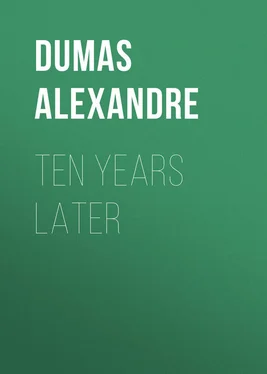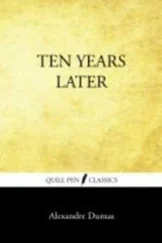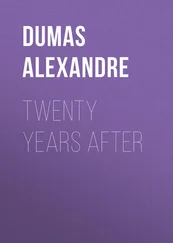Alexandre Dumas - Ten Years Later
Здесь есть возможность читать онлайн «Alexandre Dumas - Ten Years Later» — ознакомительный отрывок электронной книги совершенно бесплатно, а после прочтения отрывка купить полную версию. В некоторых случаях можно слушать аудио, скачать через торрент в формате fb2 и присутствует краткое содержание. Жанр: literature_19, foreign_antique, foreign_prose, на английском языке. Описание произведения, (предисловие) а так же отзывы посетителей доступны на портале библиотеки ЛибКат.
- Название:Ten Years Later
- Автор:
- Жанр:
- Год:неизвестен
- ISBN:нет данных
- Рейтинг книги:4 / 5. Голосов: 1
-
Избранное:Добавить в избранное
- Отзывы:
-
Ваша оценка:
- 80
- 1
- 2
- 3
- 4
- 5
Ten Years Later: краткое содержание, описание и аннотация
Предлагаем к чтению аннотацию, описание, краткое содержание или предисловие (зависит от того, что написал сам автор книги «Ten Years Later»). Если вы не нашли необходимую информацию о книге — напишите в комментариях, мы постараемся отыскать её.
Ten Years Later — читать онлайн ознакомительный отрывок
Ниже представлен текст книги, разбитый по страницам. Система сохранения места последней прочитанной страницы, позволяет с удобством читать онлайн бесплатно книгу «Ten Years Later», без необходимости каждый раз заново искать на чём Вы остановились. Поставьте закладку, и сможете в любой момент перейти на страницу, на которой закончили чтение.
Интервал:
Закладка:
At the very moment the two young men appeared at the end of one of the streets leading to the square, they perceived, crossing the square at full gallop, a young man on horseback, whose costume was of surprising richness. He pushed hastily thorough the crowd of curious lookers-on, and, at the sight of these unexpected erections, uttered a cry of anger and dismay. It was Buckingham, who had awakened from his stupor, in order to adorn himself with a costume perfectly dazzling from its beauty, and to await the arrival of the princess and the queen-mother at the Hotel de Ville. At the entrance to the tents, the soldiers barred his passage, and his further progress was arrested. Buckingham, hopelessly infuriated, raised his whip; but his arm was seized by a couple of officers. Of the two guardians of the tent, only one was there. De Wardes was in the interior of the Hotel de Ville, engaging in attending to the execution of some orders by De Guiche. At the noise made by Buckingham, Manicamp, who was indolently reclining upon the cushions at the doorway of one of the tents, rose with his usual indifference, and, perceiving that the disturbance continued, made his appearance from underneath the curtains. “What is the matter?” he said, in a gentle tone of voice, “and who is making this disturbance?”
It so happened, that, at the moment he began to speak, silence had just been restored, and, although his voice was very soft and gentle in its touch, every one heard his question. Buckingham turned round, and looked at the tall thin figure, and the listless expression of countenance of his questioner. Probably the personal appearance of Manicamp, who was dressed very plainly, did not inspire him with much respect, for he replied disdainfully, “Who may you be, monsieur?”
Manicamp, leaning on the arm of a gigantic trooper, as firm as the pillar of a cathedral, replied in his usual tranquil tone of voice, – “And you , monsieur?”
“I, monsieur, am the Duke of Buckingham; I have hired all the houses which surround the Hotel de Ville, where I have business to transact; and as these houses are let, they belong to me, and, as I hired them in order to preserve the right of free access to the Hotel de Ville, you are not justified in preventing me passing to it.”
“But who prevents you passing, monsieur?” inquired Manicamp.
“Your sentinels.”
“Because you wish to pass on horseback, and orders have been given to let only persons on foot pass.”
“No one has any right to give orders here, except myself,” said Buckingham.
“On what grounds?” inquired Manicamp, with his soft tone. “Will you do me the favor to explain this enigma to me?”
“Because, as I have already told you, I have hired all the houses looking on the square.”
“We are very well aware of that, since nothing but the square itself has been left for us.”
“You are mistaken, monsieur; the square belongs to me, as well as the houses in it.”
“Forgive me, monsieur, but you are mistaken there. In our country, we say, the highway belongs to the king, therefore this square is his majesty’s; and, consequently, as we are the king’s ambassadors, the square belongs to us.”
“I have already asked you who you are, monsieur,” exclaimed Buckingham, exasperated at the coolness of his interlocutor.
“My name is Manicamp,” replied the young man, in a voice whose tones were as harmonious and sweet as the notes of an Aeolian harp.
Buckingham shrugged his shoulders contemptuously, and said, “When I hired these houses which surround the Hotel de Ville, the square was unoccupied; these barracks obstruct my sight; I hereby order them to be removed.”
A hoarse and angry murmur ran through the crowd of listeners at these words. De Guiche arrived at this moment; he pushed through the crowd which separated him from Buckingham, and, followed by Raoul, arrived on the scene of action from one side, just as De Wardes came up from the other. “Pardon me, my lord; but if you have any complaint to make, have the goodness to address it to me, inasmuch as it was I who supplied the plans for the construction of these tents.”
“Moreover, I would beg you to observe, monsieur, that the term ‘barrack’ is a highly objectionable one!” added Manicamp, graciously.
“You were saying, monsieur – ” continued De Guiche.
“I was saying, monsieur le comte,” resumed Buckingham, in a tone of anger more marked than ever, although in some measure moderated by the presence of an equal, “I was saying that it is impossible these tents can remain where they are.”
“ Impossible! ” exclaimed De Guiche, “and why?”
“Because I object to them.”
A movement of impatience escaped De Guiche, but a warning glance from Raoul restrained him.
“You should the less object to them, monsieur, on account of the abuse of priority you have permitted yourself to exercise.”
“ Abuse! ”
“Most assuredly. You commission a messenger, who hires in your name the whole of the town of Le Havre, without considering the members of the French court, who would be sure to arrive here to meet Madame. Your Grace will admit that this is hardly friendly conduct in the representative of a friendly nation.”
“The right of possession belongs to him who is first on the ground.”
“Not in France, monsieur.”
“Why not in France?”
“Because France is a country where politeness is observed.”
“Which means?” exclaimed Buckingham, in so violent a manner that those who were present drew back, expecting an immediate collision.
“Which means, monsieur,” replied De Guiche, now rather pale, “that I caused these tents to be raised as habitations for myself and my friends, as a shelter for the ambassadors of France, as the only place of refuge which your exactions have left us in the town; and that I and those who are with me, shall remain in them, at least, until an authority more powerful, and more supreme, than your own shall dismiss me from them.”
“In other words, until we are ejected, as the lawyers say,” observed Manicamp, blandly.
“I know an authority, monsieur, which I trust is such as you will respect,” said Buckingham, placing his hand on his sword.
At this moment, and as the goddess of Discord, inflaming all minds, was about to direct their swords against each other, Raoul gently placed his hand on Buckingham’s shoulder. “One word, my lord,” he said.
“My right, my right, first of all,” exclaimed the fiery young man.
“It is precisely upon that point I wish to have the honor of addressing a word to you.”
“Very well, monsieur, but let your remarks be brief.”
“One question is all I ask; you can hardly expect me to be briefer.”
“Speak, monsieur, I am listening.”
“Are you, or is the Duke of Orleans, going to marry the granddaughter of Henry IV.?”
“What do you mean?” exclaimed Buckingham, retreating a few steps, bewildered.
“Have the goodness to answer me,” persisted Raoul tranquilly.
“Do you mean to ridicule me, monsieur?” inquired Buckingham.
“Your question is a sufficient answer for me. You admit, then, that it is not you who are going to marry the princess?”
“You know it perfectly well, monsieur, I should imagine.”
“I beg your pardon, but your conduct has been such as to leave it not altogether certain.”
“Proceed, monsieur, what do you mean to convey?”
Raoul approached the duke. “Are you aware, my lord,” he said, lowering his voice, “that your extravagances very much resemble the excesses of jealousy? These jealous fits, with respect to any woman, are not becoming in one who is neither her lover nor her husband; and I am sure you will admit that my remark applies with still greater force, when the lady in question is a princess of the blood royal!”
Читать дальшеИнтервал:
Закладка:
Похожие книги на «Ten Years Later»
Представляем Вашему вниманию похожие книги на «Ten Years Later» списком для выбора. Мы отобрали схожую по названию и смыслу литературу в надежде предоставить читателям больше вариантов отыскать новые, интересные, ещё непрочитанные произведения.
Обсуждение, отзывы о книге «Ten Years Later» и просто собственные мнения читателей. Оставьте ваши комментарии, напишите, что Вы думаете о произведении, его смысле или главных героях. Укажите что конкретно понравилось, а что нет, и почему Вы так считаете.












